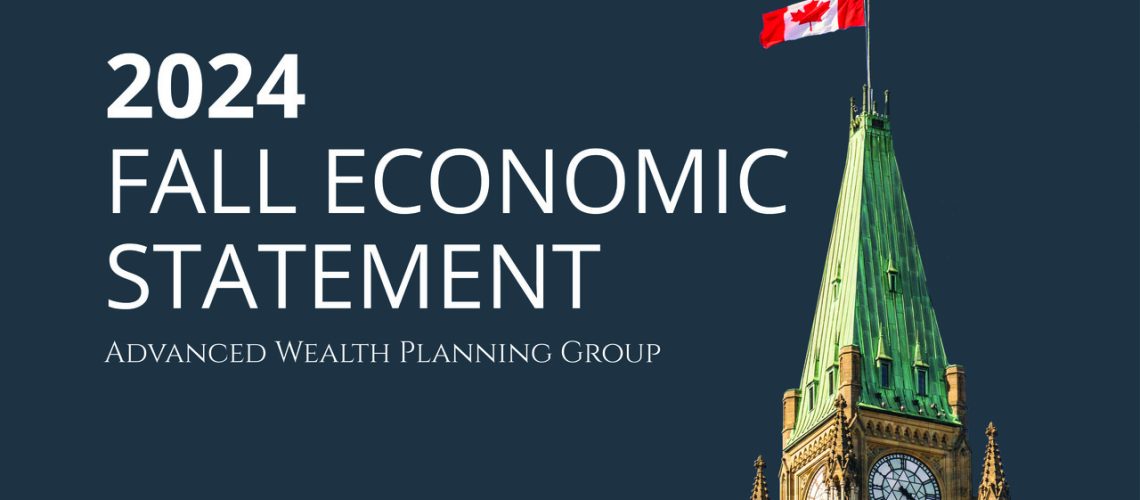Download this article as a PDF.
On December 16, 2024, amid a tumultuous day at Parliament Hill, the Federal Government released its heavily delayed 2024 Fall Economic Statement (FES 2024). Earlier that day, Chrystia Freeland resigned as Deputy Prime Minister and Minister of Finance. In her absence, FES 2024 was tabled, but not presented or debated in the House, while MP Dominic LeBlanc was being sworn in as Canada’s new Minister of Finance.
Tabled on the penultimate sitting day of Parliament for 2024, FES 2024 provides a long-awaited update on the state of Canada’s economy. It reflects a continued focus on the cost of living and housing affordability.
Key Facts:
- $61.9 billion deficit
- Capital gains inclusion rate changes to proceed – no updates
- $250 “Working Canadians Rebate” not mentioned
- No changes to personal or corporate tax rates
Update on the Canadian Economy
FES 2024 disclosed a deficit of $61.9 billion for 2023-24, an excess of $21.9 billion over the $40 billion deficit projected in Budget 2024. It also projects a deficit of $48.3 billion for 2024-25, an increase of $8.5 billion over Budget 2024 projections from eight months ago. Despite the large misses on the deficit, FES 2024 projections appear to adhere to two other previously announced fiscal objectives:
- Lowering the debt-to-GDP ratio year-over-year from 41.9 per cent in 2024-25 to 38.6 per cent in 2029-30; and,
- Maintaining a declining deficit-to-GDP ratio with deficits below one per cent of GDP in 2026-27 and future years.
Inflation has remained within the Bank of Canada’s one to three per cent target range for 2024. Inflation was two per cent in October.
Cost of Living Measures
Tax Holiday on “Essentials”
The much-publicized Tax Break for All Canadians Act was noted prominently under the heading “Reducing Everyday Costs” in FES 2024. This legislation introduced a two-month break for the Goods and Services Tax/Harmonized Sales Tax (GST/HST) on certain “essentials” including “groceries, restaurant meals, drinks, snacks, children’s clothing, and gifts”.
The federal government estimates the two-month period from December 14, 2024, to February 15, 2025, will provide Canadians with an estimated $1.6 billion in tax relief.
Notably missing from FES 2024 was any reference to what was being referred to as the “Working Canadians Rebate” which was anticipated to be a $250 cheque to “working Canadians” who met certain income limits. At this point, the rebate—which was a major point of debate in recent weeks—appears to have been largely abandoned.
Carbon Rebate Rural Top-Ups
Canadians living in rural areas are entitled to an additional 20 per cent “top-up” on the Canada Carbon Rebate. This “top-up” amounts to an additional $360 for a family of four living in a rural area. When this top-up is considered, a rural family of four could receive a total rebate in the amount of $2,160 (compared to a total rebate of $1,800 for a comparable urban family of four).
FES 2024 announces the government’s intention to expand the number of Canadians who qualify for the rural “top-up” starting in April 2025. The Federal government expects an additional 1.6 million Canadians will be eligible for the “top-up” under the expanded eligibility criteria.
Housing Affordability Measures
Adding Secondary Suites to Single-Family Homes
Building on previously announced measures in Budget 2024 to support secondary suites, the government has reconfirmed its intention to densify housing through the construction of secondary suites and laneway homes.
FES 2024 proposes doubling the loan limit for the “Canada Secondary Suite Loan Program” from $40,000 to $80,000. The program is intended to provide low-cost financing to incentivize the construction of secondary suites by providing a 15-year loan at a low-interest rate of two per cent.
The program, which will be administered by the Canada Mortgage and Housing Corporation (CMHC), is anticipated to launch in early 2025.
Accelerating Funding to Build Faster
In an effort to solve the housing supply shortage, government has developed and funded the “Apartment Construction Loan Program” in the amount of $30 billion since late 2023. Citing “high demand” for this program, FES 2024 announces plans to accelerate $2 billion in low-cost financing to ensure builders can access financing immediately to help build homes faster.
Removing the Stress Test at Mortgage Renewal
Fall Economic Statement 2023 (FES 2023) removed the mortgage “stress test” for insured mortgages at renewal. These measures were intended to allow Canadians to obtain better rates in a more competitive mortgage market. FES 2024 highlights removing the “stress test” requirements at renewal for uninsured mortgages when the holder switches from one federally regulated lender to another. FES 2024 also announces intentions to launch further consultations on the rules for insured mortgages.
Reviewing Long-Term Fixed Rate Mortgages
Historically, Canadian mortgage lenders have most commonly offered mortgage terms of five years or less. In other jurisdictions such as the U.S., 30-year fixed-rate mortgages are more common, but concede certain flexibilities when compared to the average Canadian mortgage.
FES 2024 announces interest in launching consultations on the market development of long-term mortgages for use in Canada.
Tax Measures
Automatic Tax Filing
Canada has a self-reporting tax system, whereby Canadians must file a tax return in order to report income. Failure to file can lead to interest and penalties for unpaid tax, but also to foregone benefits such as the GST credit and the Canada Child Benefit.
Expanding on a project first introduced in Budget 2023, FES 2024 announces the development of legislation to allow for the automatic filing of tax returns for certain low-income Canadians, starting for the 2025 tax year. Exploratory projects to expand automatic filing to middle-class individuals with simple tax situations and to increase access to free online tax filing software were also mentioned.
Personal Tax Measures
FES 2024 announces the government’s intention to introduce several personal tax measures, including:
- A refundable tax credit for personal support workers (no details provided except to note that it may be modelled on the tax credit for volunteer firefighters); and,
- An exclusion from income for the newly launched Canada Disability Benefit so that receipt of the benefit doesn’t reduce access to other income-tested benefits. Comments also encourage provinces to ensure receipt of the Canadian Disability Benefit does not impact an individual’s access to provincial supports and note that the government is still reviewing feedback received during the consultation on the Canada Disability Benefit Regulations.
Extending the Accelerated Investment Incentive
To attract capital investment in Canada and to maintain competitiveness against other jurisdictions, FES 2024 announces the reinstatement of the Accelerated Investment Incentive. The Accelerated Investment Incentive allows corporations to depreciate/expense capital investments more quickly for tax purposes. These measures are aimed at reducing a corporation’s tax liability and improving its cashflows.
FES 2024 announces that these accelerated write-offs will continue for qualifying assets acquired by the corporation on or after January 1, 2025, and that become available for use before 2030. The Accelerated Investment Incentive is proposed to be phased out over a four-year period between 2030 and 2033.
Scientific Research and Experimental Development (SR&ED)
SR&ED tax are designed to encourage innovation in Canadian businesses. FES 2024 proposes the following changes to the program:
- A series of enhancements: increased expenditure limits to access the enhanced (35 per cent) refundable investment tax credit (ITC) from $3 million to $4.5 million, increased taxable capital limits for the phase-out of ITC eligibility (increasing from $10-$50 million to $15-$75 million), and access to the enhanced ITC for Canadian public corporations. These enhancements will be effective for taxation years beginning on or after December 16, 2024.
- Capital expenditures on property acquired on or after December 16, 2024 are proposed to be eligible for both a deduction from income and an ITC.
- Further details on the administration of the SR&ED program and updates on qualifying expenses will be announced in Budget 2025.
- A “patent box” regime allowing lower tax rates on certain intellectual property.
Capital Gains Rollover on Business Investment
In order to encourage reinvestment in small businesses, investors selling eligible small business corporation shares can defer the capital gain on the sale if the proceeds are used to reinvest in eligible shares of another small business corporation. Replacement shares must be purchased in the year of sale or within 120 days after that year.
FES 2024 proposes to lengthen the allowed replacement period to include the full year following the year of sale. In addition, eligibility criteria for shares would be expanded to allow both preferred and common shares to qualify (currently, only common shares qualify) and to increase the asset limit for the small business corporation to $100 million (from $50 million). These changes would apply for qualifying dispositions starting on January 1, 2025.
Non-Profit Organization (NPO) Reporting
FES 2024 proposes several measures to increase reporting by NPOs and improve transparency in the sector, starting for 2026 taxation years. Currently, NPOs with passive income over $10,000 or assets over $200,000, or that have been previously required to file a return, must file an annual information return. Under these proposals, NPOs with gross revenues exceeding $50,000 would also be required to file an information return. FES 2024 also proposes a new, required short-form return for NPOs falling below the filing threshold to capture basic information about the organization.
Previously Announced Measures
FES 2024 reaffirms the government’s intention to proceed with numerous previously announced tax measures. Among them were the proposed increases to the capital gains inclusion rate and Lifetime Capital Gains Exemption and the new Canadian Entrepreneur’s Incentive, all first announced in Budget 2024 with further details and changes released in the months that followed. There was no indication in FES 2024 of planned changes to these proposed measures.
Also reaffirmed were the proposed changes to the new trust reporting rules that could, in particular, provide some filing relief for “bare trust”-type arrangements as well as the additional changes to the alternative minimum tax (though the bulk of these measures were enacted in June and took effect as of January 1, 2024) .


